Counselor’s Notebook
"Musings from the Chair"
By Jennifer McGuire, Board Chair 2022 -2023
Truth be told, I strongly dislike writing for the Counselors Notebook. In fact, it’s my least favorite part about being the chair of the MASCA board. And as someone who is nearing the end of her third term as President/chair, I have written a lot of pieces for the CN.
It’s not that I don’t like writing. In fact, I enjoy writing and I think I’m a decent writer (which I attribute, at least in part, to my liberal arts education at Franklin and Marshall College). I love writing recommendation letters, whether for students applying to colleges or scholarships, or for friends and colleagues looking to make career moves. What it comes down to is that I never really feel like I have something to share with all of you that seems worthy of the full-page, front cover story. I have shared my feelings about this with Jean, our webmaster/editor, several times, worried that my “deep thoughts” aren’t that interesting to our members. (Jean once shared with me that she calls them, “musings from the chair.”)
Heading to the conference in April, I was excited thinking about the fact that I had only two months remaining! I was
so thrilled that my district had allowed five of our school counselors to attend both days and stay overnight for the conference. Our district supported MASCA memberships for the 25 middle and high school school counselors this year, which was great in and of itself, but as the board chair, I was thrilled there would be some counselors from my district in attendance. Early Monday afternoon, I ran into the two middle school counselors near the exhibit hall. One of them said to me, something to the effect of “I didn’t realize you were the board chair. I knew you were involved, but I didn’t know to what extent.” And that’s when I realized that all my worries about my articles are for nothing, because few people are actually reading them! So, if you’re still with me here, I’m at the conference, psyched about only having two more months to write. To say that I was surprised on Tuesday to be recognized as an OSCAR is an understatement. From my perspective, being recognized by a group of people who were/are leaders in my field is truly the most meaningful and affirming professional moment in my life so far. It wasn’t long before I also realized, now I know what to write about for May!
Being surprised with something wonderful is an incredible feeling. I haven’t had a whole lot of surprises in my life. The drawback is that when you are caught off guard, it’s difficult to pull your thoughts together and eloquently express your feelings. Lucky for me, I have a front page space every month in the Counselors Notebook!
It is not possible for me to separate my career as a school counselor from MASCA. This is because while attending grad school at Boston College, Dr. Mary Walsh required the students to attend the MASCA conference. (I’m pretty sure I’ve only missed one annual con-
ference since!) I was also very lucky to intern in a district where the counselors were very active in the Cape & Islands affiliate. The connections that I made between the Cape & Islands group and at MASCA conferences have impacted my career over the last 23 years. Several of those individuals who I think of as mentors have been honored as OSCAR recipients over the years, and it is incredible to be included with them. Over the past twenty-plus years, I have made countless phone calls, sent numerous emails, and benefited from the support and advice that I have received from those that came before me in this organization.
Being involved in MASCA has exposed me to a broader understanding of the school counseling field than I would have gained strictly through working. As most of us realize early in our careers, our job tasks vary from building to building, district to district. The opportunity to connect with school counselor leaders across the state and to learn best practices and bring them back to my own school has been so valuable. Moving beyond that, the opportunity to develop leadership skills through MASCA has enhanced my career in so many ways.
I share this with you for two reasons. First, I want to publicly express my genuine gratitude to the OSCARs for recognizing me with the honor of being included among them. And secondly, to underscore what I have tried to convey all year long in my “musings by the chair,” which is that MASCA is an incredible organization that can support and enhance your career. Having experienced the movement of the organization over the past 20 years, I can truly say that MASCA is an organization that every school counselor in Massachusetts needs.
And, if you are still reading this, thank you!
MASSACHUSETTS SCHOOL COUNSELORS ASSOCIATION Vol. 59, No. 9 MAY 2023 MASCA Inside this Issue: Directory........................................2 Director's Updates .........................3 New Members................................4 CCC Readiness ...............................5 2023 Conference a Success!..........6 Early Childhood Educaiton ............7 O.S.C.A.R. Award .........................8 Career Connections......................10 Scholarhips.........................12 MA Model...................................14
Board Members:
Jennifer McGuire, Chair
jmcguire @ newbedfordschools.org
College & Career Information Coordinator
New Bedford Public Schools
Mindy Cripps, Assistant Chair
mcripps @ billericak12.com
Guidance Director, Billerica High School
Dana Catarius
catariusd @ westboroughk12.org
School Counselor, Anne Fales E.S., Westborough
Ed Connor
econnor @ dean.edu
Executive Director of Admissions, Dean College
Jessica Descartes
jdescartes @ bostonpublicschools.org
School Counselor, Tech Boston Academy
Cynthia Esielionis
cesielionis @ asrsd.org
School Counselor, Ayer Shirley Regional Middle School
Lori Ford
lford @ mlkcs.org
School Adjustment Counselor, MLK Jr. Charter School
Cory McGann
cmcgann @ ashland.K12.ma.us
Barbara Meyer
bmeyer @ miltonps.org
Director of Guidance, Gr. 6-12, Milton Public Schools
Committee Chairs:
Ruth Carrigan, Conference Committee
Ruth.Carrigan @ whrsd.k12.ma.us
Director of School Counseling, Whitman-Hansen Regional High School
Mindy Cripps, Ethics Commitee
mcripps @ billericak12.com
Guidance Director, Billerica High School
Ed Connor, Fiscal Oversight Committee
econnor @ dean.edu
Executive Director of Admissions, Dean College
Juliette Coatsworth, Government Relations & Advocacy Committee
juliette.nori @ gmail.com
School Counselor, Foxborough Regional Charter School
Andrea Encarnacao, Inclusion, Diversity, Equity & Access Committee
aencarnacao @ bostonpublicschools.org
School Counselor, Boston Latin School
Manjula Karamcheti, Inclusion, Diversity, Equity & Access Committee mkaramcheti @ gmail.com
Director of Equity and Student Support, Woodrow Wilson
Graduate School of Teaching and Learning
Tyeshia Weir, Inclusion, Diversity, Equity & Access Committee weirt @ springfieldpublicschools.com
School Counselor, RISE Academy
Dave Elsner, MA Model Committee delsner @ medwayschools.org
School Counseling Coordinator, Medway Public Schools
Cynthia Esielionis. MA Model Committee cesielionis @ asrsd.org
School Counselor, Ayer Shirley Regional Middle School
Kerry Bartlett, Member Services Committee kabartlett @ hudson.k12.ma.us
School / Career Counselor, Hudson High School
Barbara Meyer, Member Services Committee bmeyer @ miltonps.org
Director of Guidance, Gr. 6-12, Milton Public Schools
Lori Ford, Nomination and Bylaws Committee lford @ mlkcs.org
School Adjustment Counselor, MLK Jr. Charter School
Julia Cahill-O'Shea, Professional Recognition Committee j.cahill-oshea @ hwschools.net
School Counselor, Hamilton- Wenham Regional H.S.
Dina Sibila, Professional Recognition Committe sibilia @ wsps.org
School Counselor, West Springfield High School
MASCA 2022-23 DIRECTORY
Chris Soverow, Publicity Committee
csoverow @ espd.us
School Counselor, East Hampton High School
Ali Robidoux, Professional Development Committee alimrobidoux @ gmail.com
School Adjustment Counselor, Brennan Middle School
Gloria Rubilar, Research and Evaluation Committee grubilarpons @ gmail.com
Retired, Brockton High School
Jennifer McGuire, Technology Committee jmcguire @ newbedfordschools.org
College & Career Information Coordinator, New Bedford Public Schools
Appointed Positions:
Executive Director and Membership Coordinator
Bob Bardwell executivedirector @ masca.org or membership @ masca.org
Julia Cahill-O’Shea, Secretary j.cahill-oshea @ hwschools.net
School Counselor, Hamilton- Wenham Regional H.S. Counselors Notebook Editor and Webmaster
Jean Atwater-Williams atwaterwilliams @ gmail.com
IT Consultant, BizTech Associates
Maryanne Margiotta, Mentoring Coordinator mmargiotta @ stgrsd.org
Career Facilitator, Southwick Regional High School
Karen-Marie Harrington, Program Evaluation Coordinator, karen.harrington07 @ gmail.com
Liaisons:
Christine Weissman, Affiliate Liaison mweissman @ msn.com
Graduate Student, Assumption University
Megan Krell, Counselor Educator Liaison mkrell @ fitchburgstate.edu
Associate Professor, Fitchburg State University
Lisa Harney, DESE Liaison lisa.m.harney2 @ state.ma.us
MA Dept of Elem & Sec Education
Dana Catarius, Emerging Leader Liaison catariusd @ westboroughk12.org
School Counselor, Anne Fales Elementary, Westborough
Jessica Almeida, Graduate Student Liaison almeidaj @ merrimack.edu
Graduate Student, Merrimack College
Jacob Beaudoin, Graduate Student Liaison beaudy26 @ gmail.com
Graduate Student, Merrimack College
Sean Stevenson, Graduate Student Liaison S1stevenson @ student.bridgew.edu
Graduate Student, Bridgewater State University
Christine Weissman, Graduate Student Liaison/ Affiliate Liaison mweissman @ msn.com
Graduate Student, Assumption University
Julia Stone, Social Media Liaison julesstone1 @ gmail.com
School Counselor, Monson High School
Special Interest Group Leaders:
Dana Plunkett, Counseling Directors SIG plunkettd @ wellesleyps.org
Director of Guidance, Wellesley High School
Ross Wolfson, Counseling Directors SIG rosswolfson @ walthampublicschools.org
Assistant Director of School Counseling PK-12 Waltham Public Schools.l
Emma Russell, Elementary SIG erussell @ learningproject.org
School Counselor, The Learning Project Elementary School, Boston
Maria Maloney, Elementary SIG maloneym @ monsonschools.com
School Counselor, Granite Valley School, Monson
Maura Ricardi, Elementary SIG m_ricardi @ ludlowps.org
School Adjustment Counselor, East Street School, Ludlow
Melissa Clonan, Middle Level SIG mjclonan @ hudson.k12.ma.us
School Counselor, David Quinn Middle School. Hudson
Paige Kenney, Middle Level SIG p13kenney @ gmail.com
School Counselor, So. Middle School, Brockton
Anndrew Reinfeld, Midde Level SIG
anndrew.m.reinfeld @ gmail.com
School Counselor, McGlynn Middle School, Medford
Helen O’Donnell, Retirees SIG helenod @ att.net
Retired School Counselor
Anne Thidemann French, Retirees SIG
annethidemannfrench @ gmail.com
Retired School Adjustment Counselor
Nychele Clark, School Adjustment Counselors/ School Social Worker SIG clarkn @ gardnerk12.org
School Adjustment Counselor, Gardner High School
Kate Niedel, School Adjustment Counselors/ School Social Worker SIG cniedel @ aol.com
Retired School Adjustment Counselor
Anne Thidemann French, School Adjustment Counselors/School Social Worker SIG
annethidemannfrench @ gmail.com
Retired School Adjustment Counselor
Karen McCrillis, Secondary SIG mccrilk @ gardnerk12.org
School Counselor, Gardner High School
Leanne Soulard, Secondary SIG soulardl @ franklinps.net
School Counselor, Franklin High Schooll
Rachael Weinhold, Secondary SIG rweinhold @ winchendonk12.org
School Counselor, Winchendon High School
Shelly Boisvert, Urban SIG sboisvert @ lowell.k12.ma.us
School Counselor, Lowell High School
Whitney Goodwin, Urban SIG goodwinw @ worcesterschools.net
College and Career Readiness Liaison, Worcester Public Schools
Rani Gould, Urban SIG gouldr @ springfieldpublicschools.com
School Counselor, The Academy at Kiley Middle School
Annie McCarthy, Vocational/Technical SIG anniek1 @ gmail.com
School Counselor, Franklin County Technical School
Maryrose O'Neil, Vocational/Technical SIG oneilm @ tantasqua.org
School Counselor, Tantasqua Regional High School
Lauren Robillard, Vocational/Technical SIG lrobillard @ baypath.net
School Counseolr, Baypath Regional Technical H.S.
Emerging Leaders:
Renee Considine, Emerging Leader rconsidine @ hwrsd.org
School Counselor/School Adjustment Counselor/ Career Facilitator, Minnechaug Regional High School
Shannon Dion, Emerging Leader sdion @ stgrsd.org
School Adjustment Counselor/Social Worker, Southwick-Tolland Regional High School
Will English, Emerging Leader wenglish @ beverlyschools.org
School Adjustment Counselor, Beverly Middle School
Cory McGann, Emerging Leader cmcgann @ ashland.k12.ma.us
School Counseling Department Head, Ashland H.S.
Megan McShane, Emerging Leader Megan.mcshane.2 @ gmail.com
School Counselor, St Columbkille School, Catholic Schools of Boston
COUNSELOR’S NOTEBOOK 2
Conference Recap
By Bob Bardwell, MASCA Executive Director
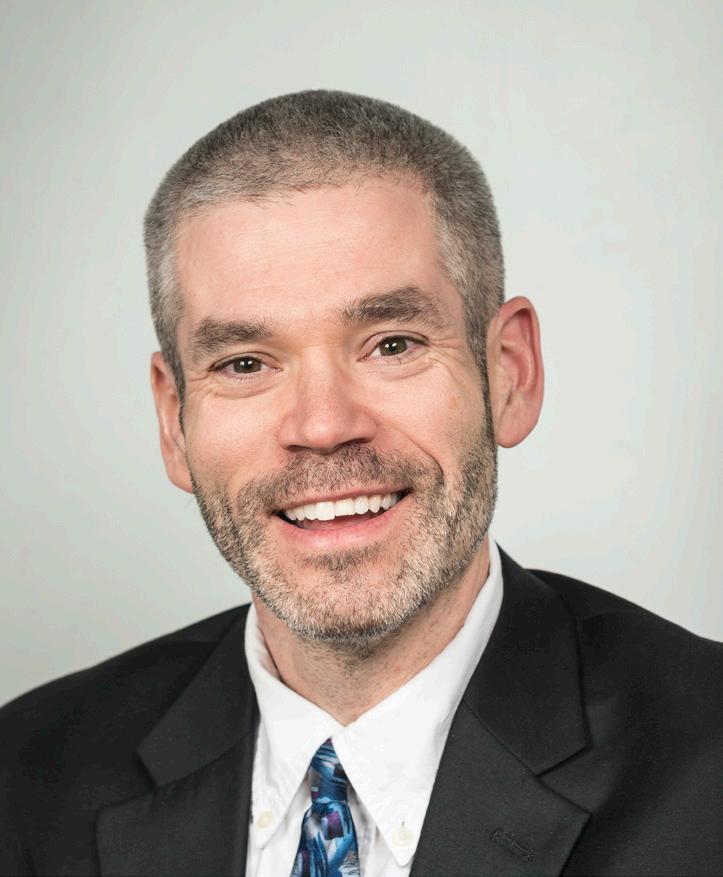
The 2023 Annual Spring Conference is now history and another one for the MASCA history books. Thanks to the 572 participants (516 in person and 56 virtual) who attended, the 2023 conference will go down as one of the most attended in MASCA history. We had so many in-person participants that we actually had to shut off in-person registration because we had reached capacity in the hotel ballroom. In addition to having no more space for participants, we also maxed out on exhibitor space. Certainly, this was not great for those who were turned away but it was a nice feeling to know that more people wanted to attend than could.
If you have never been to MASCA’s premier professional development event you have missed out. In addition to great professional development, our conference provides time for networking with other counselors, meeting with dozens of exhibitors, seeing our wonderful graduate student poster presentations and the opportunity to participate in MASCAs annual membership meeting.
The 2023 conference featured six pre-conference options, two keynote speakers (Rodney Harrison, 2019 Teacher of the Year and Wendy Rock, ASCA Ethics Chair), six pre-conference sessions, 28 breakout sessions, 54 exhibitors and sponsors, 38 graduate student poster sessions, one reception, two meals, three Exhibitor Bingo winners and a whole lot of networking and connections.
For those who were not able to attend in person, do not fret. You can still participate by accessing the recorded content. All 28 breakout sessions and the three major sessions (opening ethics session, Tuesday morning keynote and the Tuesday lunch) were all recorded and available electronically through May 31. You can still register for this content until May 31. Once you are a registered virtual conference participant, you can also request access to earn 10 or more PDP’s by signing up here. All PDP forms must be submitted by June 16, 2023. Graduate credit through Lindenwood University is also available.
In addition to the conference, MASCA also hosted a meeting during the day on Tuesday to discuss the growing shortage of qualified and certified school counsel-
ors with eight other educational associations and stage agencies including the Executive Office of Education, MA Department of Elementary and Secondary Education, MA Superintendent’s Association, MA Teachers Association, Boston Teachers Union, the Rennie Center, a school counselor educator representative and the MA Business Alliance for Education.
The meeting allowed time for each of these groups to discuss that they are doing to address the current shortage of qualified school counselors and think about ways to work together to address the gaps. There were some great solutions shared to address the shortage ranging from providing graduate students with paid internships, creating a PSA about the school counseling profession and educating college academic advisors about the benefits of being a school counselor. Look for more information about this critical topic and what MASCA is doing about it in the coming months.
We also were able to bestow our 18th OUTSTANDING SERVICE COUNSELING AWARD of RECOGNITION (O.S.C.A.R.), to Jennifer McGuire. “Not an annual MASCA award, the MASCA O.S.C.A.R. was established by the Governing Board in 1986 as part of MASCA’s 25th Anniversary. A lifetime achievement award, O.S.C.A.R. recognition is given to a school counselor who has dedicated
a professional career of distinguished and exemplary service to the profession of school counseling. Being identified as a MASCA O.S.C.A.R. is the highest honor that can be bestowed upon a member of the school counseling profession in the Commonwealth of Massachusetts.”
In addition to being the outgoing Board Chair, Jen has served as the Board leader two previous times as President Elect, President, and Past President, the only person in our 62-year history to serve as a Board leader three times. She has served in various other leadership capacities both at the local level for the Cape & Islands Guidance Association and for MASCA. Congratulations Jen. Look for more information about Jen elsewhere in the Counselor’s Notebook
Of course the conference is not the only way to connect with MASCA and participate in valuable professional development. We host other in-person events as well as numerous zoom meetings and trainings. However, there is something special about connecting with our peers in person, being able to spend time together learning, celebrating and improving our craft. This is especially true for counselors because of our need to connect. I often hear that “I cannot be out of the office even for one or two days.” While there is no one likely doing your job while you are away, if you have never attended you owe it to yourself to take the plunge and try it out. Despite your absence, your students and families will be better because of the information and networking that you are able to attend. That is a promise.
MASCA is already beginning to plan for the 2024 conference. It will most likely be around the same time frame in early April, after Easter but before vacation and will be in a larger space so we can accommodate all of those who want to attend in person – no more turning people away. In the meantime, be thinking about a possible session proposal as we will begin to solicit those in early fall once returning from the summer break.
Speaking of summer break, the end of the school year is quickly approaching. Be sure to take care of yourselves during these last two months. May and June are often brutal for school counselors. Stay strong my friends.
MAY 2023 3
Robert Bardwell Executive Director, MASCA
Welcome to our Newest Members
The following have joined MASCA in the last month:
Kathleen Allen
Priscila Anderson
Julie Baker
Geoffrey Baltera
Tara Bean
Kevin Blake
Laura Cabral
Leah Cantler
Amber Casavant
Alan-Michael Chest
Mary Bridget Chick
Robert Coe
Kerri Coen
Lori Coleman
Jennifer Colleran
Jean Corrielis
Nina Davidson
Anne Dio
Megan Dougherty
Kate Dulac
Justina Ercolino
Frank Flynn
Emily Freeman
Katie Gingras
Allison Harmon
Patty Healy
Claire Horn
Susan Howland
Mark Hubbard
Charles Jendrysik
Chris Jerrier
Paul Kirschbaum
Felicia Lachance
Deanna Latham
Jennifer Lingenberg
Travis Loggia
Krystel Love
Jammie Lussier
Ellen Mahoney
Quincy McCray
Naomi Mejia
Kevin Merrigan
Patrick Mullen
Jeffrey Newsome
Christine Nogueira
Yameci Nunez
Charlotte Ochs
Nataki Pascall
If you know any of these new members, please extend a warm welcome and greeting.
We are happy you have joined us!
Alli Pearce
Tiffany Pereira
Maria Petrelli
Jessica Phelps
Rebecca Pianta
Casey Pinsonneault
Fengdan Qiu
Jennifer Razi-Thomas
Elizabeth Rivera
Stefanie Rogal
Melody Rolon
Sara Runkle
Adam Seidel
Tracy Slater
Jillian Stewart
Courtney Tackett
Maria Theodorakakis
Keith Therrien
Carla Vaughan
Anita Walton
Meridith Welch
Kira Wong
Wenting Zhu
COUNSELOR’S NOTEBOOK 4
College, Career & Civic Readiness
The state definition of College, Career, and Civic Readiness opens with the statement: “Massachusetts students who are college and career ready and prepared for civic life will demonstrate the knowledge, skills, and abilities that are necessary to successfully complete entry-level, credit-bearing college courses, participate in certificate or workplace training programs, enter economically viable career pathways, and engage as active and responsible citizens in our democracy.”
The state definition goes on to identify three domains that must be addressed for student success – personal/social development, workplace readiness, and academic learning. From a child’s entrance into the preK-12 education system, they are on a journey to success after high school. Districts and schools are responsible for providing the teaching and learning experiences that address students’ diverse learning needs and support all students’ abilities to learn and achieve in each of the three domains in every grade.
These three domains align with the ageold questions we have all asked ourselves:
• Who am I? (personal/social domain)
• Where am I going? (career development domain/workplace readiness)
By Lisa Harney, DESE
• How do I get there? (academic and postsecondary planning)
So, how do districts and schools ensure their students can answer these questions with confidence as they leave high school? Two key initiatives – Pathways and MyCAP – are designed to empower students to drive their education choices through self-discovery and align their career and academics with personal interests, skills, talents, and passions.
Pathways has become a universal term for a deliberate or intentional plan created, developed, and refined over a designated time that will lead a student to gain the knowledge, skills, and experiences necessary for postsecondary success. A pathway can be state designated, such as Early College Pathways, Innovation Career Pathways, or career technical education. However, if a school has none of these options, it can still support individual pathway development by ensuring students have access to six key components:
• career advising,
• labor market information (to ensure career interests are viable),
• instruction that integrates academic and technical courses,
• work-based learning experiences,
• opportunities to earn industry-recognized credentials, and
• postsecondary linkages.
The second key initiative, MyCAP (My Career and Academic Plan) is both a process and an instrument. As a student-directed process, it helps students discover their individual interests, skills, talents, and passions and align these with career interests. That, in turn, enables them to engage in thoughtful college and career planning, which leads to a personal pathway to success. As a tool, MyCAP documents the achievement of the learning objectives in each domain at every grade level. MyCAP is the foundation that braids the three domains, ensures the development of student-driven pathways, and ultimately prepares students for success after high school.
The Department now offers a draft Scope and Sequence for MyCAP development for grades 6-12. In addition, there is a three-workshop professional development series to support MyCAP planning, workshops for implementation support, and technical assistance available to all public schools and school districts in the Commonwealth. If your school is interested in joining the MyCAP network for next school year, please email Lisa Harney at lisa.m.harney@mass.gov.
uAspire is partnering with DESE this school year to bring a variety of free resources and services to students and counselors across the state of MA to support FAFSA completion efforts such as online trainings for counselors, a virtual FAFSA help desk, student-facing webinars, and Zoom-based appointments to help complete the FAFSA and next steps.

You will find a variety of helpful free tools and resources on this website .
Contact Erica Rose at ericar@uaspire.org if you have additional questions.
MAY 2023 5
MASCA 2023 Conference a Historic Success!
By Ruth W. Carrigan, M.Ed, MASCA Conference Chair and Director of School Counseling, Whitman-Hanson Regional School District
Thank you to all of you who helped make MASCA history with a sold out conference at the Boston Marriott Newton on April 3 & 4th. We were thrilled to welcome over 600 participants to our annual professional development conference.


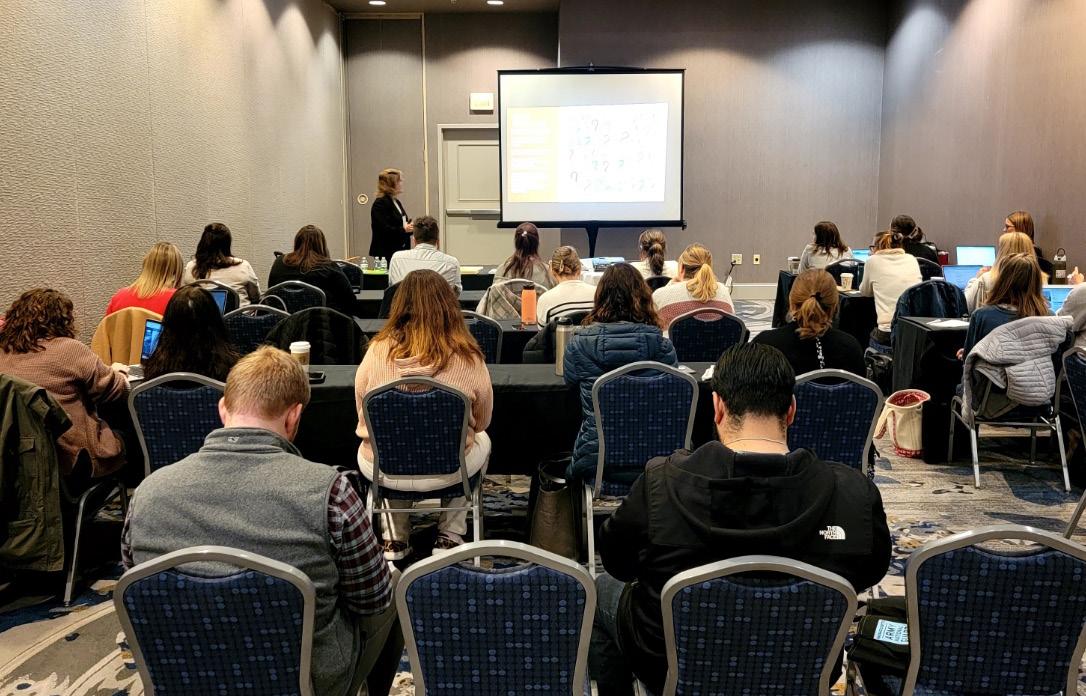

The conference featured five excellent pre-conference sessions and welcomed Dr. Wendy Rock, ASCA Ethics Chair, as our Opening Workshop Speaker. Wendy presented a great session on Working with Minors in Schools: Legal and Ethical Considerations Our keynote speaker, Rodney Robinson, 2019 Teacher of the Year and current Senior Policy Advisor with Richmond
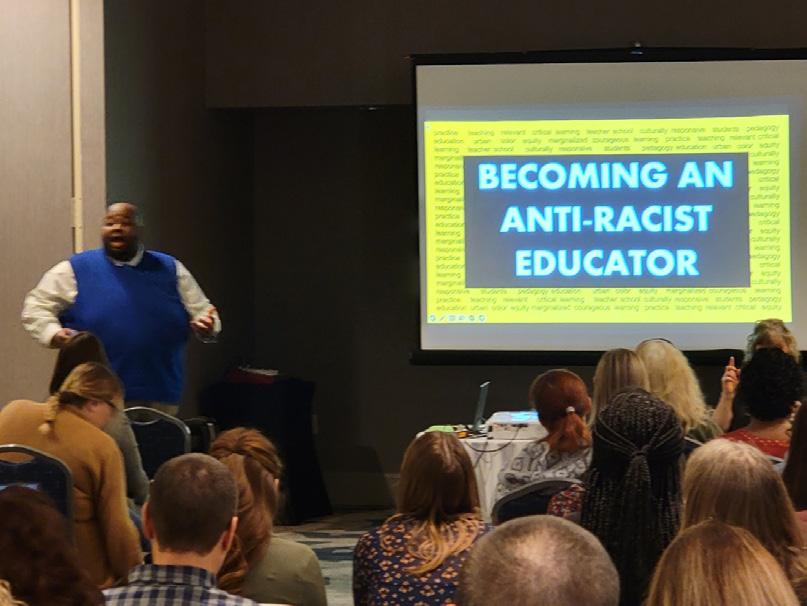
Public Schools, energized conference attendees with his address What is Equity and Why Do All Children Deserve it
The 2023 MASCA Conference also featured greetings from ASCA Board Member Rebecca Pianta, remarks from Dr. Regina Robinson, DESE Deputy Commissioner, 28 break out sessions, graduate student posters, and recognition of MASCA annual award winners.





There is still time to register to view the recorded content which will be available through May 31, 2023. Simply visit this link for information on how to register and view the content.
If you registered for and participated in the conference (virtually and/or in person) you can still earn PDPs for only $25. You have to participate in a minimum of 10 hours of conference content (in person, virtually, or a combination of both) with the opportunity to earn more PDP’s for each additional hour of content that you watch virtually. Register and pay for PDPs here. All conference PDP online forms must be submitted no later than June 16, 2023.
If you have any questions, or if you are interested in being part of the 2024 MASCA Conference Committee, please contact Ruth Carrigan at Ruth. Carrigan@whrsd.org
COUNSELOR’S NOTEBOOK 6
The Role of School Counselors in Early Childhood Education
 By Megan McShane, MASCA Emerging Leader and School Counselor, St Columbkille School, Boston
By Megan McShane, MASCA Emerging Leader and School Counselor, St Columbkille School, Boston
Each day I make it a point to walk through the Early Childhood hallway at school because those 2.9 to 5 years olds have a way of making a fellow human feel loved and welcomed. As I get unexpectedly tackled with hugs or I have ten small voices hollering, “MS. MCSHANE!” any tough moments from the day disappear. This experience is a constant reminder that children enter their school experiences filled with acceptance of all, love to give, and a positive outlook on school. It is also during these formative years that school may turn into a negative place for a child or a child may receive their first label of being the “tough friend” or “perfectionist.” School Counselors are in a position to begin advocating for these students before that first label is given. Time spent teaching early childhood students social, coping, or regulation skills helps students build their foundation of social emotional skills needed for their future school success.
During the COVID lockdown, I would host each class in my school on Zoom once a week, including the PreK classes. I would bring Puppy, my puppet, out to be silly and Puppy would share how he missed school. I might get one or two word answers from the few students who showed up if I asked a question. I honestly did not think my impact was meaningful in those brief zoom sessions. Yet the feedback I began receiving from parents of the PreK and Kindergarten students was overwhelmingly positive and appreciative. It reminded me that this age group, which we sometimes overlook because we have middle school drama or recess conflicts in the primary grades, is just as important to dedicate our time to. Since returning
from the COVID pandemic, I have seen an increase in toileting troubles in these early childhood grades. This being one thing young children can control in life, it signaled to me that even our youngest students were greatly impacted by the stressors of the COVID-19 pandemic.
Last school year I was able to pilot the Kimochis curriculum, an emotional literacy program created by Nina Rapport Rowan. Kimochis provides early childhood students with both quality lessons and communication tools. Through the simple yet meaningful lessons, I was able to watch my students be able to grasp in just a few minutes skills that help them to begin to advocate for their needs and problem solve independently. In addition to quality lessons, Kimochis provides tools like emotion posters and small emotion face pillows that all of our early childhood teachers have placed
in their Calming Corners. When a student is overwhelmed, they are trained in the routine of going to the Calming Corner and use the Kimochis emotion pillows to help communicate their feelings. The effectiveness of the Kimochi curriculum is shown most when my PreK students from last year tell me how they are using Kimochis or how a peer is acting like Huggtopus, one of the favorite characters.
Once I have that emotional literacy foundation created, I use the We Thinkers curriculum published by the Social Thinking Group with my Kindergarten classes to build a social skill foundation. We Thinkers explicitly teaches students the social skills we adults sometimes expect children to magically just know. School Counselors are essential at the Early Childhood level so early prevention work can begin before there is a problem with students in PreK or K and a referral has to be made to the special education or the School Adjustment Counselor.
In addition to having a quality school counseling curriculum, it is crucial for counselors working with Early Childhood to have developmentally appropriate resources to provide parents and teachers. Some resources I recommend are the Center on the Social and Emotional Foundations for Early Learning (CSEFEL) and Center of the Developing Child out of Harvard University. Since beginning my work as an Elementary School Counselor in 2016, it has become clear to me that prevention work is an essential part of my role. The earlier I can teach my students in their school experience, the more effective I can be in setting my students up for social and emotional success.
MAY 2023 7
MASCA O.S.C.A.R Awarded to Jennifer Just McGuire
On April 4 at the annual MASCA Spring Conference, our highest honor – the MASCA O.S.C.A.R. - was presented to Jennifer Just McGuire.
THE HISTORY OF THE MASCA O.S.C.A.R.
The MASCA O.S.C.A.R. (Outstanding Service to School Counseling Award Recognition) was established by the Governing Board in1986 as part of MASCA’s 25th Anniversary. It was created to recognize Oscar Krichmar, who had been actively involved with MSCA from the time of its first planning and organizational meetings in 1960-61 through the entire twentyfive years of MSCA’s existence. His roles during those 25 years included being MSCA president, the executive secretary and founding editor of the Counselors Notebook.
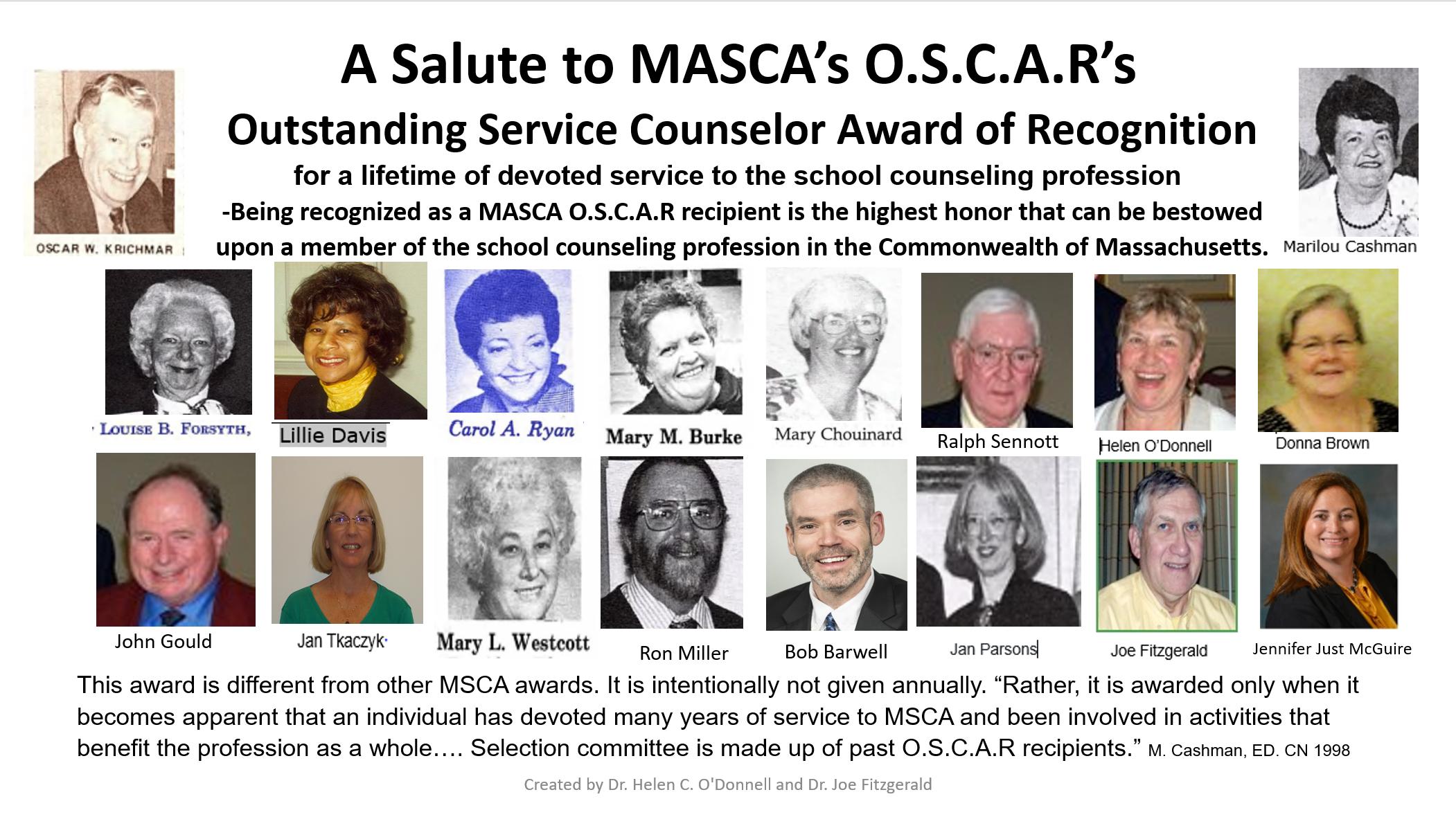
The O.S.C.A.R is not an annual award, but a professional lifetime achievement award. Being recognized as a MAS-
CA O.S.C.A.R. is the highest honor that can be bestowed upon a member of the school counseling profession in the Commonwealth of Massachusetts. The purpose of the award is to tribute and honor school counselors who have dedicated a professional career of distinguished and exemplary service to MASCA and the profession of school counseling in Massachusetts. It is awarded when a person is recognized as exemplifying the qualities and primary considerations of this award including both their length of time and service to MASCA.
The 17 recognized O.S.C.A.R awardees represent decades-long commitments to and advocacy for MASCA and the school counseling profession. There are 11 living OSCARS today including Lillie Davis, Mary Chouinard, Helen O’Donnell, Mary Westcott, Donna Brown, John Gould, Jan Tkaczyk, Ron Miller, Bob Bardwell, Jan Parsons and Joe Fitzgerald.
ABOUT OUR NEWEST O.S.C.A.R HONOREE
Our 18th OSCAR is no stranger to MASCA having served in various capacities on the Governing Board for the past 17 years. Beyond her years of service, our recipient has been instrumental in moving the organization forward from a 20th century statewide association that connected and advocated for school counselors to a thriving, vibrant and data driven 21st century business serving the needs of all school counselors in Massachusetts. She is not afraid of taking on a challenge, confronting the status quo or adopting a future focused vision. She has also been instrumental in helping MASCA enter the modern world of social media by promoting our activities and sharing critical information through various social media applications. Not only has she been on the Board on and off since 2006, but she has been the MASCA president and/or
COUNSELOR’S NOTEBOOK 8
O.S.C.A.R Award
(continued)
Board Chair not one or two, but three times. No one in our 62-year history of the organization has done that before. This fact alone certainly shows a love for the profession and commitment to MASCA that is unmatched.

Today’s honoree got started in her local affiliate, the Cape & Islands Guidance Association. She has been a long-time member and coordinator of the AllCape College Day.
In addition to her work for MASCA, our recipient is an experienced and competent school counselor having worked in various capacities at Upper Cape Cod Regional Technical School since 2004. In her last role at Upper Cape she was the Teacher Leader for Guidance, where she was responsible for coordinating all aspects of the counseling program from curriculum review to classroom lessons to admissions. Her work included oversight of student 504 plans, communicating effectively with other school leaders and the coordination of post-secondary programming for all students. She left Upper Cape in July of 2023 to take on a brand new position as the College & Career Information Coordinator for the New Bedford Public Schools, a brand new position for that district.
Beyond her volunteer work for MASCA, our awardee has memberships in other professional associations, has presented at multiple conferences in the Commonwealth and across the country and is often asked to serve on task forces or committees representing school counselors or vocational schools. She is able to manage these numerous tasks not with only ease but also in a most effective manner. She also manages to be an involved and active wife and mother to two teenage boys.
Congratulations to our 18th MASCA O.S.C.A.R. -, Jennifer Just McGuire.
Jennifer Just McGuire, as she was completing her 3rd MASCA leadership term was surprised at the Spring Conference with recognition as MASCA’s 18th O.S.C.A.R Awardee. Not an annual award, this recognition (Outstanding School Counselor Award of Recognition) is the highest honor that can be bestowed on a school counselor in the Commonwealth of MA. MASCA O.S.C.A.R’s who introduced Jen (left to right) Ron Miller, Mary Westcott, Bob Bardwell, and Jen.

Jen in the audience beginning to realize that she might be the recipient of the award
Jen with her husband, Scott, as she accepted her O.S.C.A.R.
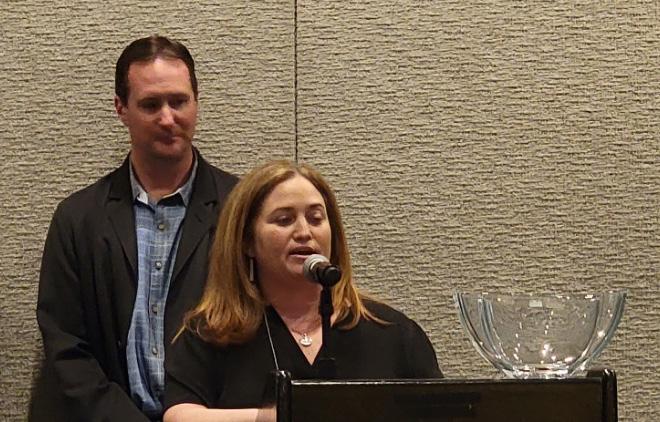
MAY 2023 9
Career Connections: Focus on UMass Lowell
submitted by Judith Josephs, Ed.D
This series of "History of Success" videos highlight UMass Lowell as a public research university in Lowell, Mass. with a satellite campus in Haverhill, Mass. UMass Lowell is the northernmost member of the University of Mass public university system. With 1,110 faculty members and over 18,000 students, it is the largest university in the Merrimack Valley and the second largest public university in the state. The university has high research activity. The university’s ongoing research has the potential to solve some of the today’s most serious problems with top industry partnerships..

Themes: Public Research University, offering affordable, experienced-based undergraduate and graduate degrees, Return on Investment, Research offerings: Fabric Discovery Center, the RIST Institute for Sustainability and Energy, Raytheon-UMass Lowell Research Institute, HEROES expertise between intellectual assets from UMass Lowell and U.S. Army Combat Research Facilities to enhance protection of U. S. Soldiers, Core Research Facilities working with 200 external industry users and partners, Mass Medical Device Center, Biotech Incubator. Paid Internships offered at university with outstanding company partners, important research being done in medicine, fabrics, energy, protecting US soldiers, and partnerships with 200 companies.
tration and Management, Psychology, Mechanical Engineering, Criminal Justice, Information Science, Computer Science, Biology, Electrical and Electronic Engineering, Civil Engineering
Chancellor Julie Chen, University of Mass Lowell, discusses her leadership background as UMass fourth chancellor and the second woman to lead the university of more than 18,000 students. Dr. Chen started her new role on July 1, 2022. Julie was a student athlete and academic All-American in Softball and Field Hockey. Dr. Chen learned the importance of teams from her athletic background. Chancellor Chen has played a major role in facilitating innovative research models bringing together industry, government, and academia. Dr. Chen led the university’s growing research into a $95 million annual operation. Dr. Chen was the Chief Research Officer before becoming the Chancellor and a recognized leader in research, STEM, and economic development in higher education.
Chancellor Chen discusses the reasons why students should choose to attend UMass Lowell. She introduces the opportunity to do both research and paid internships as part of student experiences.
Themes: Research Opportunities, Paid Internships, Entrepreneurship, Industry Partnerships, Strong STEM Majors, Return on Investment, Opportunities to Enter Business, Strong Technology majors, Latest Equipment Usage, Links to North Shore Technology, Mass Life Sciences, Mass Clean Energy Center, Mass Technology Collaborative, Choice of many majors both liberal arts and sciences, Business Adminis-
Video #3 Dr. Anne Maglia, Vice Chancellor of Research and Innovation
UMass Lowell
University of Mass/Lowell Vice Chancellor Anne Maglia discusses her background in the field of Research and the fact that UMass Lowell is a National Research University committed to preparing students for work in the real world—helping to solve real problems and offering help to real people---by providing an affordable, high-quality education.
Themes: National Research University, Industry Partnerships, National Science Foundation Program Director, Sound Recording Technology and Meteorology Degrees, Top Majors: Electrical and Electronic Engineering, Biological Sciences, Computer Science, Engineering Programs, High Return on Investment
Connection: Dr. Anne Maglia is the Vice Chancellor of Research and Innovation at the UMass Lowell
Video #4 Dr. Paul Beaudin Provost of Academic Affairs and Loreen Tirrell, Interim Student Recruitment Director and Professor Culinary Arts and Business at Northern Essex Community College The guests share their careers.

(continued on next page)
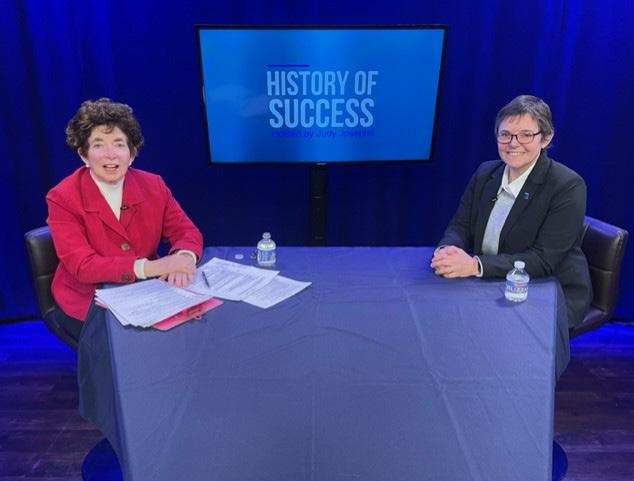
COUNSELOR’S NOTEBOOK 10
Video #1 Part 1 UMass Lowell
Video #2 Part 2 UMass Lowell
Career Connections
(conti nued from previous page)
a mix of originals, standards, rock and pop songs. She started playing the piano at Age 4.
May 2023 Awareness Dates
and present the differences and collaborations between the 15 community colleges. They also present the idea of a community of learners and highlight support given to help students to navigate their career pathways
Themes: Difference between Certificate Programs and Degree Programs, Workforce Development, Job Training, Culinary Arts, Unique differences between Community Colleges, Create a community with sister colleges, Higher Education System, Governor Healey’s Mass Reconnect, Center for Adult Academic Pathways, Joint Admission UMass Lowell and Northern Essex Community College, Student’s Voice, Importance of Alumni, American Sign Language Degree
Connection: Joint Admission between UMass Lowell and Northern Essex Community College

History of Success: Loreen Tirrell & Dr. Paul Beaudin | March 6, 2023
Themes: Benefits of Music Education, Playing Musical Instrument, Singing, writing Songs, increase in academic learning, Music Instruction helps to manage stress, creativity, discipline, ways to healthfully express emotions, cooperation, critical thinking, dedication to excellence, knowledge about their culture and the culture of others.
Asian-Pacific American Heritage Month
Better Hearing and Speech Month
Clean Air Month
Jewish American History Month
Mental Health Month
Military Appreciation Month
National Bike Month
National Foster Care Month
National Physical Fitness and Sports Month
Video #5 Marlene Daley, singer, songwriter, pianist displays her talent with a medley of songs. Marlene plays

Connection: Music is a universal language. UMass Lowell has one of the most distinguished music programs in the region, nationally recognized for its innovative offerings and successful alumni. Students looking for a top academic experience and an excellent music education program will find all that at UMass Lowell.
All videos were completed at the Lynn Community Television Studio
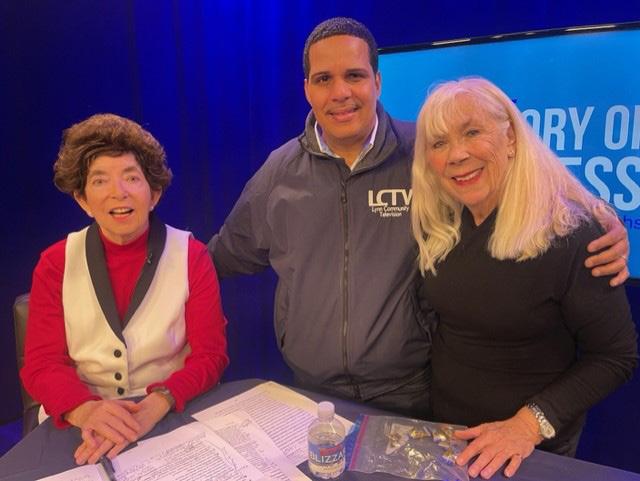
Additional Lynnn Community Television videos are available at https://lynntv.org/watch-online/
Editor's Note: This the seventh installment showcasing Lynn Community Television's "History of Success" updated with new videos. Previous articles appeared in the March 2021, December 2021, March 2022, June 2022, September 2022 and January 2023 issues of the Counselor's Notebook.
Teen Pregnancy Prevention Month
1-5 National PTA Teacher Appreciation Week
1-5 Screen Free Week (TV Turnoff Week)
1-7 Choose Privacy Week
4 National Children’s Mental Health Awareness Day
17 International Day Against Homophobia, Transphobia, and Biphobia
21 Armed Forces Day
25 National Missing Children’s Day
31 World No Tobacco Day
MAY 2023 11
Ronald Frederickson Gradate Student Research Scholarship Winners


Graduate Student participants in MASCA’s 2003 Spring Conference were invited to submit a picture of their poster presenting results of their action research projects completed during their 2022-23 practicum/internships for one of 4 – $25 Research scholarships honoring the legacy of Dr. Ronald Fredrickson, professor emeritus, UM Amherst.
Pilot Multilingual Learner Peer Mentor Group
 Kelly Thurston
Kelly Thurston
Survey Results
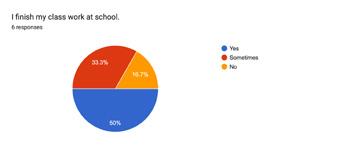


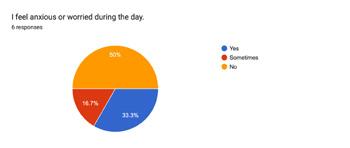


Discussion
Materials & Methods

serves as a buffer for these students therefore interventions that teach these skills while maintaining cultural responsiveness are needed (Castro-Olivo, 2014). ML students have a better chance of decreasing negative behaviors in the school community when social emotional concerns are addressed.
The overall goal in launching a ML peer mentor program in the middle school was to allow newcomers to have an easier transition. Many students are learning new cultural values and norms as well as starting in a whole new district. Finding both academic success and cultural congruity during the self-discovery phase are important (Brazill et al., 2021). Research has shown peer mentor programs have the ability to contribute greatly to student success in multiple areas. This type of a program allows students to connect with peers who at the very least have also been new students in the district. There may be students who have similar cultural experiences as well which can help new students feel supported in their transition. Mentor and mentee relationships have the opportunity to close gaps where teachers and counselors will not have the same impact. The group ran once a week during first period when all students had advisory. Seventh grade students were given instruction on the daily activity and then proceeded to run the group. Each group was structured around an activity that included an aspect of social emotional learning. Week one, students engaged in a game with conversation questions to get to know each other. Students were excited to have things in common with their peers in different grades. In other weeks, students worked on activities about coping skills, teamwork, positive affirmations, and confidence. Students became more comfortable as the group went on and the selected seventh grade students strengthened their leadership skills by the end of the group.
A pre test was conducted with 6 out of 8 students in the group. The testing showed that 50% of the students felt anxious or worried during the day and did not feel that they had someone in the school they could share their feelings with. About 67% of the students in the group did not always know an adult they could approach if they needed help. An informal group question allowed the researcher to discover that many students had never been to the counseling office and were unsure of the purpose.
Another important factor that the survey aimed to connect was school climate and academic progress. Although most students were passing classes, many of them were not receiving high standards of competency and about 50% of students were not finishing their classwork in school. There is a correlation between academics and social emotional skills. If students do not feel they know an adult whom they can ask for help from, they may also not be asking for help academically during the day. By creating relationships with peers, it will increase the people that they can ask for help from during the day. The mentor group aimed to connect students with peers who spoke the same first language and came from similar cultural backgrounds. Finally, the study was able to target an attendance issue in the peer mentor group. Many days that the group ran there were significant students who were tardy or absent. By adding these students into morning groups, they can be held accountable for coming to school on time. If students enjoy the peer mentor group, it can also create incentive for them to come to school. In all, the study was able to target many needs of the multilingual

College and Career Readiness for Multilingual Students


 Julia Richards
Julia Richards
Salem State University

Faculty Advisor: Johanna Smith, MEd
X2: This software is where all student data is housed. Instead of issuing a demographics survey, this information was collected through this software.


Blackboard: Early College courses held through the local community college use this platform to post assignments and grades for students. The professors have provided access to the researcher to view these grades to see the progress students made. North Shore Community College provides teachers with alerts of students who are in danger of failing or need more support after the first three weeks of class and again at the midpoint of the semester. These alerts were used to determine what percentage of students needed more support from a tutor in this study.


Semester 1:
RESULTS
Researcher came in midway through the semester and supported students in one of the two classes with tutoring.
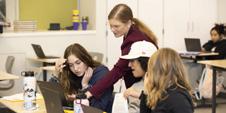
35% of the students were Multilingual Learners At the mid-way point of the semester, 31% of students showed that they needed improvement or were in danger of failing. 100% received tutoring and 100% of these students passed This percentage of students showing that they needed improvement all received tutoring support from the researcher. Semester 2:

were implemented.

COUNSELOR’S NOTEBOOK 12
Multilingual Learners (ML) are often lost in the shuffle of day to day responsibilities in school systems. Over the past few years, there has been an increase in ML students at the middle school level that is projected to grow over the upcoming years. It is important for ML students to establish a sense of belonging in their school environment. Building positive peer relationships in school can help ML students adjust during their transition to a new country. By building a feeling of connection to both the school and other students, new students can thrive academically, socially, and behaviorally. Abstract Introduction Many studies have been conducted on the influence that peer mentor programs have on youth. The pilot Multilingual Learners group focuses on a student-led approach that allows newcomers to learn rules and regulations about the school while also making connections with their peers. This type of program promotes many social emotional learning techniques. Castro-Olivo (2014) mentions that immigrants who speak a different language are more apt to suffer from discrimination and acculturative stress. This particular statement magnifies the need to address the social emotional well-being of ML students. Social emotional resilience
population at GMS and has provided findings that would be beneficial for future counseling groups. Future Implications Implement the group with more students •Utilize open circles for group structure Flexible timing for the group to ensure attendance Open the group to all newcomers in grades 6, 7, & 8. Procedure The ELL teacher at Garfield Middle School was initially contacted for a recommended list of students to participate in the pilot peer mentor group. In order to contribute to the study, participants had to agree and were given the option to opt out. On the first group meeting date, students were presented with a pre test survey. The overall time it took students to complete the survey was from 3 to 5 minutes. 6 out of the 8 students participated in the survey. Salem State University Faculty Advisor: Johanna Smith, M.Ed.
Participants Participants consisted of 4 students from the sixth grade and 4 students from the seventh grade. All students spoke Spanish as a first language. Group Process References Brazill, S. C., Myers, C. B., Myers, S. M., & Johnson, C. M. (2021). Cultural congruity and academic confidence of American Indian graduate students in STEM: Peer interactions, mentor cultural support, and university environment fit. Journal of Diversity in Higher Education https://doi-org.corvette.salemstate.edu/10.1037/dhe0000353\ Castro-Olivo SM. Promoting social-emotional learning in adolescent Latino ELLs: A study of the culturally adopted Strong Teens program. School Psychology Quarterly 2014;29(4):567-577. doi:10.1037/spq0000055
ABSTRACT English Language Learners can fall behind their peers in school, hurting their chances of receiving a diploma. With a growing number of Multilingual learners (ML) students, it is important for schools to accommodate the needs of this population so that they are prepared for life after high school. Early College classes are a great way for students to receive college credit, for no cost, giving them a leg up when going to college. This project aims to increase awareness around Early College classes and support students and their families in understanding how it can benefit them. Effectiveness will be measured through checking grades before and after adding support and through looking at sign-ups for Early College in the spring. Major hypothesis 1: The students’ grades in their Early College courses will improve with additional support Major hypothesis 2: Giving presentations to multilingual learners about the benefits of Early College will be positively correlated with multilingual learner enrollment. OBJECTIVES 1.Create supports for students through a tutoring hub 2.Hold an informational meeting for students and parents to promote the program HYPOTHESES Aspen
After
the semester, 11% of students needed extra support
This is a correlational study on the relationship between multilingual Early College students’ grades, enrollment data, additional support, and advertising of the Early College program among high school students in the North Shore of Massachusetts. Data was collected through Blackboard, a platform that holds students’ grades. Participants 52 high school students attending a North Shore, public high school during the 2022-2023 school year 14 ML students 9 students on either an IEP or 504 plan No Exclusion Criteria Demographics of School (Massachusetts School and District Profiles, 2022) 81% of students went on to further their education after graduating from this high school (Saugus Public School District). Sex: 47.6% female, 52.1% male Race: 45% students of color High needs students: 58% First Language Not English 23.3% Low-Income Students 46.9% Interventions Implementation of Tutoring Hub Presentations in ML classes Family Night Info Session Presentations in all student homerooms METHOD DISCUSSION The research suggests that there is a connection between ML students, Early College programs, and aid in the classroom Barriers for students taking Early College courses identified in this study: Placement tests for Early College classes Outside commitments i.e., jobs, service, lack of transportation, family responsibilities A course they wanted to take was not offered Benefits for students identified in this study: Students showed improved grades after receiving support from tutors and counselors. More students signed up for Early College when they were aware of the opportunity. Students felt they were more knowledgeable about college in general after taking these courses. IMPLICATIONS Important to identify student’s needs and barriers they face Connect students with available support – promoting the tutoring hub in this case Provide honest information about the program – not just convincing students to take the course even if it is not in their best interest – Inclusive advertising led to higher enrollment for the Spring Semester Encouraging ML students to take advantage of opportunities like Early College helps to empower them! References available upon request Thank you! Julia Richards | 978-810-8307 | j_richards12@salemstate.edu Professor Emily with students --TUTORING HUB T U T O R N G H U B Saugus Ea y Co ege Prog am P h p h Nor h Shore Commun y Co ege -@ b h d Mrs. Mone Ms. Richards
recruitment strategies
18% of students were Multilingual Learners. 160% increase in enrollment At the mid-way point of
MEASURES
Kelly Thurston, Salem State University
Julia Richards, Salem State University
Caregiving Youth: Identifying and Supporting Students Who Provide Care for Family Members
Jen Montagna, Westfield State University

A Positive Behavior Intervention
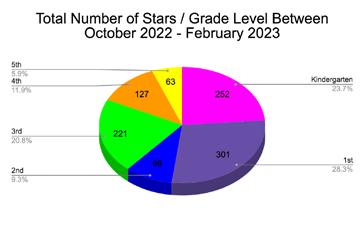



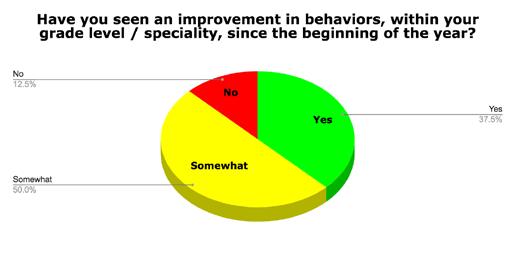




Faculty Advisor: Bethany Norton, M.Ed., CAGS Angela Malone
Angela Malone, Salem State University

MAY 2023 13 In the United States there are over 5.4 million youth caregivers between the ages of 8 and 18 who provide care for family members who are chronically ill, injured, elderly, or disabled (AACY, 2022; Armstrong-Carter et al., 2021; Hunt et al., 2005). These at-risk students are often stressed, exhausted, depressed, and anxious, which can impact their schoolwork, attendance, behavior, physical health, and mental health. By identifying and providing support for these youth, we can help students build on their strengths and resiliency, find success in school, process their feelings, as well as share and develop coping skills. INTRODUCTION OBJECTIVES Create and post survey on Microsoft Forms, Google Forms, or another data gathering app Distribute survey to students (ex. English 11 and 12 classes) Gather facts and information on caregiving and caregiving youth Analyze survey results Share results with faculty and staff Reach out to students who provide care for someone at home Create and implement in school supports and provide outside referrals and resources as needed MATERIALS & METHODS “The stress and responsibility weighs down on my motivation, mental health, even physical health. Your ‘free time’ goes into having to balance work you've missed because an emergency happened, trying to fit your own daily routine like fitting in a meal or even showering, there's not much you're able to do once someone else is so dependent on you. And then comes the emotional support but then you don't have that same figure for yourself.” (female, high school senior) “It just sucks to see/hear my mom cry and sometimes it just feels like I'm the only one with a working mind. I'm mostly worried about my mom because I'm not going to be able to be with her and she’s not in the best place mentally.” (male, high school senior) “I help my mom with her panic/anxiety attacksand they happen very frequently.” (female, high school junior) “I refuse to give up on myself, and also refuse to give up on my father. It’s just something hard about being first generation in your family's history with the United States.” (female, high school senior) “Sometimes I have to take days off to help around the house.” (male, high school senior) “It just makes me truly exhausted and very depressed” (female, high school junior) STUDENT COMMENTS WHAT CAN SCHOOLS DO? Listen Try to understand Create student support groups to meet during lunch or afterschool if not an inconvenience to the already overextended students Teach students to focus on their strength and resiliency Teach students to advocate for themselves just as they do for their loved ones Share and help students develop coping skills Provide a safe space for students to talk or take a break if needed Provide flexibility/more time on assignments if possible REFERENCES AACY –American Association of Caregiving Youth. (2022). Retrieved August 8, 2022, from https://aacy.org/ AARP and the National Alliance for Caregiving. (2020, May). Caregiving in the U.S. 2020 -AARP Research Report https://www.caregiving.org/wp-content/uploads/2020/05/Executive-SummaryCaregiving-in-the-United-States-2020.pdf American Psychological Association. (n.d.). Young caregivers. American Psychological Association. Retrieved February 1, 2023, from https://www.apa.org/pi/about/publications/caregivers/practicesettings/intervention/young-caregivers Armstrong‐Carter, E., Johnson, C., Belkowitz, J., Siskowski, C., & Olson, E. (2021). The United States should recognize and support caregiving youth. Social Policy Report 34(2), 1–24. https://doi.org/10.1002/sop2.14 Berardini, Y., Chalmers, H., & Ramey, H. (2021). Unfolding what self-compassion means in young carers’ lives. Child and Adolescent Social Work Journal 38(5), 533–545. https://doi.org/10.1007/s10560-02100791-8 Bridgeland, J. M., DiIulio, J. J., & Morison, K. B. (2006). The Silent Epidemic: Perspectives of High School Dropouts. Washington DC: Civic Enterprises. https://docs.gatesfoundation.org/documents/thesilentepidemic3-06final.pdf Hunt, G., Levine, C., & Naiditch, L. (2005). Young caregivers in the U.S. findings from a national The National Alliance for Caregiving in collaboration with the United Hospital Fund. https://www.caregiving.org/wp-content/uploads/2020/05/youngcaregivers.pdf To start conversations among middle and high school counselors regarding youth caregivers To create an awareness of caregiving youth To identify students who provide care To look at the effects of caregiving on middle/high school students To educate faculty and staff on youth caregivers To provide support for students who serve as caregiving youth Westfield State University Jennifer
S. Montagna
SAMPLE STUDENT SURVEY QUESTIONS EXAMPLES OF CAREGIVING TASKS Do you help provide care for anyone (parent, grandparent, sibling, etc.) at home? Who? What type of care do you provide? (ex. feeding, medication management, wound care, etc.) Would you like to receive extra support from school? What kind of support would best help you? How many hours per week do you provide care? How does caregiving affect other areas of your life? (attendance, tardiness, mental health, mood, schoolwork, sleep, etc.) Any additional information or comments on caregiving? Managing Medication Doing Laundry Taking care of wounds Keeping track of appointments Cooking, Following diet recommendations, Feeding Bathing and dressing Helping with movement Providing emotional support and company Paying bills Shopping Cleaning the house Helping with childcare
“Just listen and take the time to understand what we might be going through”
are more than 5.4 million caregiving youth in the United States, which
1
youth
care
Caregiving youth struggle with school attendance, being on time, their mental health, and academics Students and teachers participated in the STAR intervention from October 2022-February 2023. 443 students encompass the school population.
There Method By February 2023, 50% of students across all gradelevels will be recognized for outstanding STAR behavior. The total amount of stars school wide equivalates to 1008 out of 443 students; surpassing the percentage goal of having 50% of all students across grade-levels being recognized as a star student.
equates to approximately Results
in 5 Conclusions The PBIS-inspired intervention, ‘S.T.A.R’, positively supported a diverse K-5 elementary school just North of Boston. Through an effort to improve the culture of school behavior, monthly, school-wide assemblies taught students about SelfControl, Thinking of Others, Acting Responsibly, and Respectful. These community assemblies focused on social-emotional topics allowing students to be recognized and praised for their positive behavior throughout the school day. Through data collection, team leadership meetings, and consistent PBIS
who provide
for someone
implementation of STAR, students gain a sense of self through expression of positive and expected behaviors among their peers and fellow school leaders. When student behavior is regulated in the classroom setting, areas such as student academics, are positively correlated and supported.
request*
*Research references available upon
Contact Angela Malone 978-771-4755 ammalone333@gmail.com
Improving a School Community’s Behavior Culture: S.T.A.R
Abstract In an effort to improve the culture of school behavior, monthly, school-wide assemblies showcasing the acronym, ‘S.T.A.R’, will be implemented in a diverse K5 elementary school just North of Boston. STAR encompasses Self-Control, Thinking of Others, Acting Responsibly, and Respectful. STAR, modeled after systems of Positive Behavior Interventions & Supports (PBIS), students will be educated on critical socialemotional topics as well as allow students to be recognized and praised for their positive behavior throughout the school day. Implementing this intervention over the course of 5 months, the effectiveness of STAR will be measured by daily STAR student recognitions, STAR class recognitions, teacher surveys, and monthly STAR awards presented at assemblies. Procedure Counselor-led, monthly STAR assemblies covering school counseling topics Star Student Bracelet Rewards • In order to fund supplies and bracelets, a grant was written and approved to support the STAR program Students could receive endless number of stars throughout the year and continue to collect star bracelets. All star rewards were divided by grade level as data was recorded to differentiate success between grades. The Goal of S.T.A.R: To improve students’ behavior across grade levels while delivering a positive, universal school message to all community members PBIS tactics offer school communities positive opportunities to bridge the gap between academics and behaviors exemplified within a school culture. There are many steps that come with a school successfully adopting and sustaining an intervention mirrored after PBIS systems (McIntosh et al., 2016). PBIS systems motivate students to strive towards demonstrating expected behaviors with the proper positive encouragement of school stakeholders. Discussion S.T.A.R’s Mission: Assembly Monthly Topics: S.T.A.R Breakdown Self-Control Kindness Bullying Guest Speaker: ‘Connor’s Kindness Project’ UNEXPECTED STUDENT BEHAVIORS INCREASE INDIVIDUAL STUDENT RECOGNITION & SUCCESS FOR DEMONSTRATING POSITIVE STAR STANDARDS If students are impacted positively through systems created around PBIS, behaviors will decrease while student success increases Teachers from each grade level participated in STAR through either rewarding students for expected and above and beyond behavior and/or completed STAR feedback forms. The number of teachers in each grade level include: • (4) Kindergarten, First, Second, Third, and Fourth grade teachers (3) Fifth grade teachers (6) Specialists (Art, Music, Library, Health, Gym)
The students reported presenting their posters was an incredible professional opportunity and experience! MASCA thanks you for your willingness to share your research with your practitioner colleagues.
Implementing the MA Model 3.0: A Framework for ComprehensiveSchool Counseling Programs
by Helen O'Donnell, Ed.D, MASCA MA Model Committee, 3.0 Writing Team Co-Chair, PD Institute Trainer
Endorsed by both MA DESE and MA School Counselors Association's Governing Board, the MA Model 3.0: Framework for Comprehensive School Counseling Programs is an evolving document to guide professional best practice. It was presented as a professional courtesy to the field in the spring of 2020 as a public domain resource. This ongoing Counselor’s Notebook (CN) series shares steps and strategies for implementing the MA Mode 3.0 and ASCA Model 4.0©. A library of updated MA Model resources and CN implementation articles can be accessed from the MA Model page of the MASCA website. (Choose MA Model option under Resources tab.)
MA Model Announces Upcoming Trainings
Being Accoutable and Data-Informed
School Counselors share their action research questions, explain assessment strategies and action plans, present compiled student outcome data, and summarize their research findings. Join us to hear practitioner stories and learn about action research in action!.
May 18, 2023 2:30-4:00
Sponsored by Franklin Hampshire Counseling Association and Hosted by MASCA and the MA Model Committee
Workshop Facilitator: Helen C. O’Donnell, Ed.D
FREE for MASCA members. Attendance raffle prizes to be awarded.
Register Here:
https://us02web.zoom.us/meeting/register/tZMsdO6qqz4qHdAOyX4cElKlc6l1U3XGCAFK#/registration
Cannot attend? Complete the MA Model survey here and be entered into a MASCA Membership raffle:

https://docs.google.com/forms/d/e/ 1FAIpQLSfYW_HgF6OZTL2F2ywerlPh0E3a_Az4i8hpHHkIhMQ8XZSKGQ/ viewform?usp=pp_url
MA Model 3.0 Institute Training for 3 graduate credits or 45 PDP
Registration is open for the summer/fall offering of these graduate MA Model Institutes vetted for 3 graduate credits by Fitchburg State University. Target course completion Dec. 31,2023 or as soon as course requirements completed.
MA Model 3.0 Introductory Workshop
Counselors in K-12 Classrooms: Delivering Curriculum That Supports Academic Achievement & College/Career Readiness (CCR)
Counselors in K-12 Classrooms: Action Research and Program Assessment
Coursework guided by MA Model and ASCA Model and requires virtual instruction, webinar viewing, peer collaboration, Tier 1 curriculum delivery and assessment, completion of a MARC Jr., and on-going project support. Required assignments vary based on graduate course selected and are personalized to meet registrant identified needs and outcome goals.
Trainer: Helen C. O’Donnell, Ed.D , MA Model committee and MA Model 3.0, co-chair/editor; Adjunct Graduate Faculty, FSU
Institute registration fee: $450 each (include 45 PDP’s)
Option: $295 for 3 graduate credits from Fitchburg State University
Inquiries and registration information: helenod@att.net
14
The mission of MASCA is to promote excellence in the school counseling profession by advocating for, connecting, supporting, and empowering school counselors in the Commonwealth of Massachusetts through leadership, collaboration, and professional development.

Visit us on the web at www.MASCA.org
MASCA deeply values its diverse membership and is fully committed to creating an organization where each individual is welcomed, included, respected and empowered. No person will be excluded from MASCA on the basis of race, color, religion (creed), gender, gender expression, age, national origin (ancestry), disability, marital status, sexual orientation, political affiliation or military status, or for any other discriminatory reason.
These activities include, but are not limited to, appointment of its Governing Board, hiring or firing of staff, selection of volunteers and vendors, and the providing of services.
MAY 2023 15













 By Megan McShane, MASCA Emerging Leader and School Counselor, St Columbkille School, Boston
By Megan McShane, MASCA Emerging Leader and School Counselor, St Columbkille School, Boston










 Kelly Thurston
Kelly Thurston









 Julia Richards
Julia Richards

















